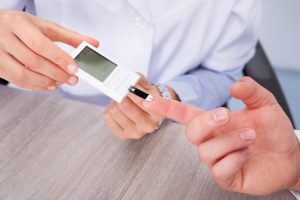 Low testosterone raises the risk of type 2 diabetes in men as testosterone helps regulate blood sugar levels. The researchers found that testosterone triggers essential signaling mechanisms in islets, which are clusters of cells within the pancreas producing insulin.
Low testosterone raises the risk of type 2 diabetes in men as testosterone helps regulate blood sugar levels. The researchers found that testosterone triggers essential signaling mechanisms in islets, which are clusters of cells within the pancreas producing insulin.
Senior author Dr. Franck Mauvais-Jarvis said, “We have found the cause — and a potential treatment pathway — for type 2 diabetes in testosterone-deficient men. Our study shows that testosterone is an antidiabetic hormone in men. If we can modulate its action without side effects, it is a therapeutic avenue for type 2 diabetes.”
Advertisement
For the study, researchers used specifically bred male mice with pancreatic beta cells lacking the receptor to testosterone. The mice were fed a typical Western diet rich in sugars and fat, and then tested their response to glucose. The mice lacking the androgen receptors developed lower insulin secretion, which led to glucose intolerance, compared to control mice.
The study suggests that testosterone amplifies the islet impact of glucagon-like peptide-1 (GLP-1), a hormone produced after a meal, which is currently used as a diabetes treatment.
Link between low testosterone and diabetes
The link between type 2 diabetes and low testosterone has been long known. Men with type 2 diabetes are twice as likely to have low testosterone, compared to men without type 2 diabetes. Although a link has been found, it does not necessarily reveal that low testosterone causes type 2 diabetes. It does reveal, though, that certain lifestyle factors may contribute to type 2 diabetes as well as low testosterone. This suggests that a man can reduce his risk of low testosterone and type 2 diabetes by sticking to a heart-healthy lifestyle.
Studies have shown that low testosterone in men can contribute to insulin resistance or a reduction in insulin sensitivity. When you have insulin resistance, your body does not use insulin effectively, so glucose builds up in the blood, ultimately leading to type 2 diabetes.
Managing both conditions is as simple as eating healthy meals, exercising regularly, and maintaining a healthy weight. Depending on your testosterone levels, your doctor may also prescribe the testosterone replacement therapy. If this is the case, you should have regular check-ups with your doctor as some studies have shown such therapy can increase the risk of type 2 diabetes as well.
Dr. Ahmer Farooq, assistant professor of urology at Loyola University Medical Center in Maywood, said, “Men need to know that there’s hope for whatever they have and that they shouldn’t feel ashamed. If they have any worries about their testosterone levels or any sort of medical issue, they should get it checked out.”
